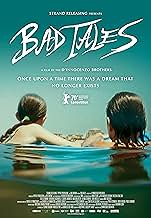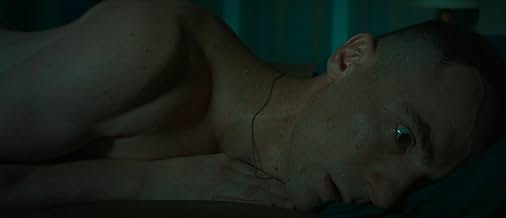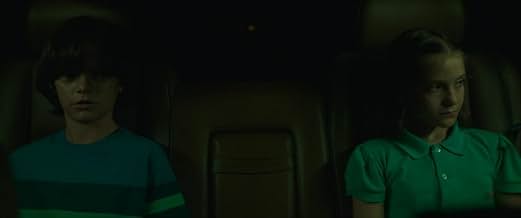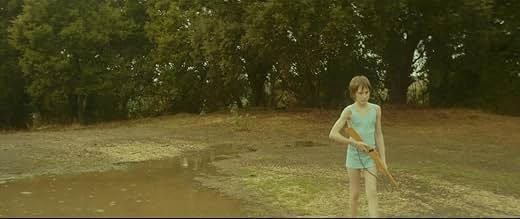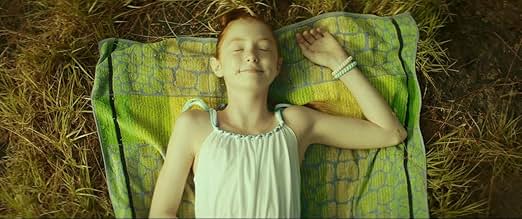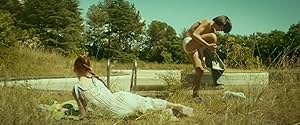NOTE IMDb
6,4/10
7,3 k
MA NOTE
Quelques familles précaires dans la banlieue de Rome. Les tensions ici peuvent exploser à tout moment; ce sont finalement les enfants qui provoquent l'effondrement.Quelques familles précaires dans la banlieue de Rome. Les tensions ici peuvent exploser à tout moment; ce sont finalement les enfants qui provoquent l'effondrement.Quelques familles précaires dans la banlieue de Rome. Les tensions ici peuvent exploser à tout moment; ce sont finalement les enfants qui provoquent l'effondrement.
- Réalisation
- Scénario
- Casting principal
- Récompenses
- 22 victoires et 28 nominations au total
Avis à la une
My personal favorite of the 2020 Berlin International Film Festival and winner of the Berlinale Bear for best script. The film introduces itself as: A true story inspired by a false story. The false story is not very inspired. Sounds mysterious? It better be, for this is a film enjoyed more the less you know. Okay, I'll give you this much: a dark look at life in the subjrbs outside Rome, where people's aspiration clash with reality. The story of a summer broken down into a sequence of immersive scenes, each containing its own drama and driven by an atmosphere of suspense. All is mostly viewed through the eyes of the kids. Highly recommended! On a side note: this is the second film of the D'Innocenzo Brothers that I've seen, and it is astonishing to observe how much they've matured as film makers and story tellers. Their first film - La Terra de'l abbastanza - had all the pieces but lacked a forceful plot to tie them together. Favolacce deliverd this force, in a unique way.
Seen at Berlinale 2020, it is a film that looks at the relationships between parents and children. There is a lot going on in this little Italian suburb, but one thing is for sure, the parents make much more noise than the children. It is a story about growing up or never managing to do so. Worth seeing.
"Favolacce" is undoubtably a good movie, thanks to the inspired screenplay, the anxious score, the solid acting and the frustrating direction. And I say frustrating because the D'Innocenzo's brothers intentionally chose the camera angles that were the less adapt to the scenes in order to provoke a sense of discomfort in the viewer. And this discomfort is what the movie leaves after the credits, a general bitterness for what happened in it. The complaint I have, that is the reason why I didn't love it, is the setting. The ultra degraded suburb filled with pessimistic, poor and angry people similar to the one represented in "Dogman" is excessive and distant from the actual reality. And I'm not saying there aren't difficult situations but here is a bit too extreme and I felt a certain detachment from the characters because they really felt fictional to me (maybe the only one that I perceived as plausible is the one played by Elio Germano). And probably it actually was the intention of the filmmakers in order to tell some tales, as the title suggests, but I would have liked it more if the context was more real and then I think that what happens in the movie would have hit me a lot harder than it did. In conclusion "Favolacce" is good, surely a fine watch, but the level of appreciation you will feel is correlated to how much you will buy its setting and its characters.
This Italian Swiss TV coproduction with Sky TV won a screenplay award at the Berlin Film Festival. We saw it in a group of cinephiles. In the discussion afterwards we could not find one reason how this could have been possible. Maybe every other film in the contest was written worse, but that is hard to imagine. Maybe the jury wanted to play a practical joke. Even the narrator in the film apologizes for the senslessness and boredom of these random and badly written script. Any of the scenes could have been replaced with any other. It makes no difference. It was sad to witness how the art of film has deteriorated both in the making and in a venue of appreciation that once held some prestige. Nice cinematography though, one star for that and one for casting.
It's hard to review such a title: talking about the plot might give away too much or be misleading. I'll just write my observations on the final product: not very useful for those who have to decide whether to watch it or not but well... that's it.
Despite the initial word joke about the source material, I found the story quite inspired - whether it is supposed to be true, made up, a mix, a fairy tale or whatever hermeneutical meta-perspective we are supposed to adopt. Inspired, as was the previous (and first full length) film written and directed by the D'Innocenzo brothers: "La terra dell'abbastanza". Unfortunately I found here the same problems I found there: the overall result is uneven, disjointed, a little inconsistent and often cold.
By cold, I don't mean that it lets the viewer feel the unbridgeable divide between these kids/adolescents and their parents: that divide emerges as an overall unwillingness of adults to understand (or even listen) to kids. By cold I mean that while I wasn't bored wacthing the film, I didn't care either about most of what happened to most of the characters: alienating. Among other things this is mainly due to scenes too stylized/simplistic and to the acting from the kids which - with few exceptions - is not good enough.
At times surgical in a too detached way and others indulging in irrelevant details that just stress the same buttons or feel gratuitously obscure. Finally - and in this worse than "La terra dell'abbastanza" - "Favolacce" feels sometimes inconsistent even for those willing to spend time trying to decipher the code:
Or the questions ARE the story, and we're just tricked with opaque symbols and vague happenings into believing that there's more (and in this "La terra dell'abbastanza" fared better given its plain Noir status). I don't feel like attempting to reach the "hermetic intellectual heights" of any author: for sure I won't make an exception in this case.
Still some scenes and characters magnetize the viewers' attention and alone deserve to be watched (thanks to both the direction, supporting actors like the very good Ileana D'Ambra and Barbara Chichiarelli and/or the writing).
Surely I won't miss D'Innocenzos' next work: yet - and I'm really unsure which one - I would suggest to the authors to work together with a better screenplayer, a better director or both.
Despite the initial word joke about the source material, I found the story quite inspired - whether it is supposed to be true, made up, a mix, a fairy tale or whatever hermeneutical meta-perspective we are supposed to adopt. Inspired, as was the previous (and first full length) film written and directed by the D'Innocenzo brothers: "La terra dell'abbastanza". Unfortunately I found here the same problems I found there: the overall result is uneven, disjointed, a little inconsistent and often cold.
By cold, I don't mean that it lets the viewer feel the unbridgeable divide between these kids/adolescents and their parents: that divide emerges as an overall unwillingness of adults to understand (or even listen) to kids. By cold I mean that while I wasn't bored wacthing the film, I didn't care either about most of what happened to most of the characters: alienating. Among other things this is mainly due to scenes too stylized/simplistic and to the acting from the kids which - with few exceptions - is not good enough.
At times surgical in a too detached way and others indulging in irrelevant details that just stress the same buttons or feel gratuitously obscure. Finally - and in this worse than "La terra dell'abbastanza" - "Favolacce" feels sometimes inconsistent even for those willing to spend time trying to decipher the code:
- who is this narrator that talks like columnists (and screenplayers..) write, finds quite an intellectual's hobby, but has the most unrefined and boorish accent of the film?
- are we supposed to (re-)read "the Canterville Ghost" to LOVE the movie?
- are we supposed to listen again and again to the badly pronounced/registered dialogues to not miss what's said?.
- are we supposed to give our own answers to these and all the other questions that arise watching this "fable"?
Or the questions ARE the story, and we're just tricked with opaque symbols and vague happenings into believing that there's more (and in this "La terra dell'abbastanza" fared better given its plain Noir status). I don't feel like attempting to reach the "hermetic intellectual heights" of any author: for sure I won't make an exception in this case.
Still some scenes and characters magnetize the viewers' attention and alone deserve to be watched (thanks to both the direction, supporting actors like the very good Ileana D'Ambra and Barbara Chichiarelli and/or the writing).
Surely I won't miss D'Innocenzos' next work: yet - and I'm really unsure which one - I would suggest to the authors to work together with a better screenplayer, a better director or both.
Le saviez-vous
Meilleurs choix
Connectez-vous pour évaluer et suivre la liste de favoris afin de recevoir des recommandations personnalisées
- How long is Bad Tales?Alimenté par Alexa
Détails
- Date de sortie
- Pays d’origine
- Site officiel
- Langue
- Aussi connu sous le nom de
- Sages comme une image
- Lieux de tournage
- Sociétés de production
- Voir plus de crédits d'entreprise sur IMDbPro
Box-office
- Budget
- 2 000 000 € (estimé)
- Montant brut mondial
- 208 419 $US
Contribuer à cette page
Suggérer une modification ou ajouter du contenu manquant

Lacune principale
By what name was Storia di vacanze (2020) officially released in India in English?
Répondre
![Regarder Trailer [OV]](https://m.media-amazon.com/images/M/MV5BZDVkZjQxODYtZjllYi00ZTU4LWEyZTctN2Q5YWYwZDljNjA0XkEyXkFqcGdeQXRyYW5zY29kZS13b3JrZmxvdw@@._V1_QL75_UX500_CR0)


